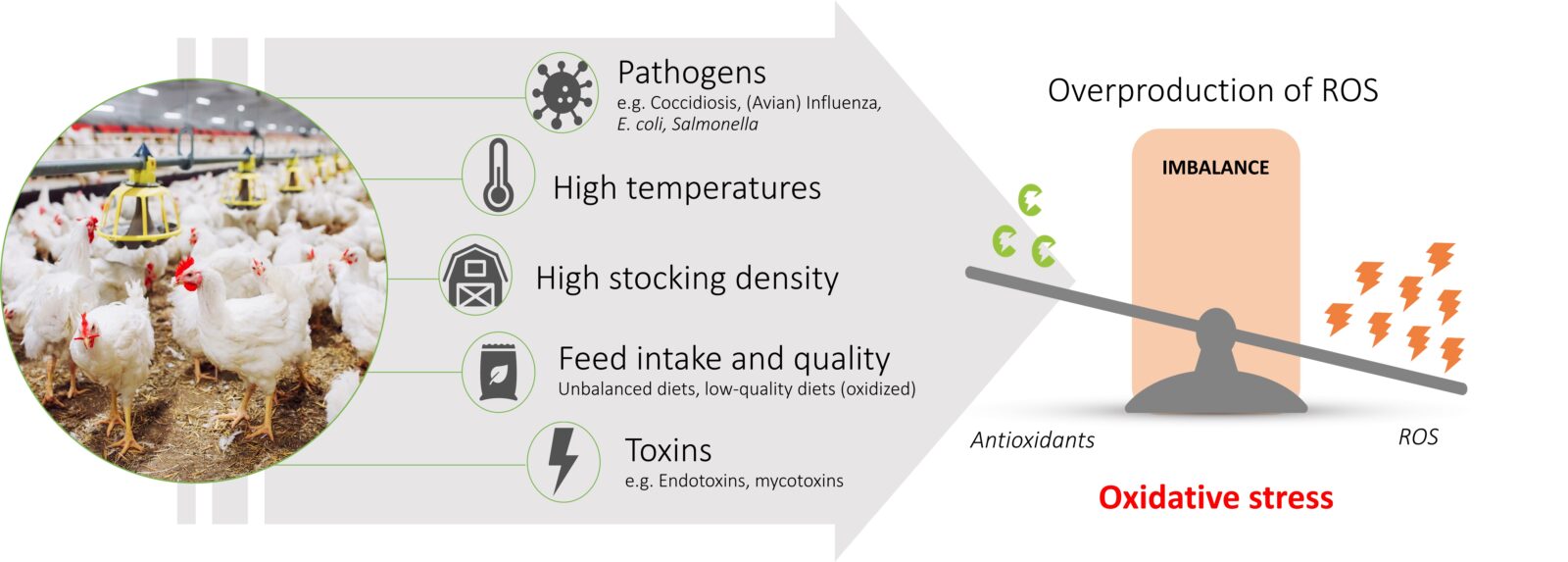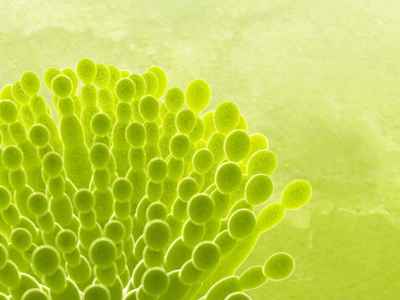Oxidative damage in poultry and pigs:
how it affects their growth and performance?
Improving health and resilience by stimulating their antioxidant defenses
Intensive production systems expose animals to stressors like heat, weaning, pathogens, and toxins, leading to oxidative stress – an imbalance between antioxidants and reactive oxygen species (ROS).
This damages cells and tissues, triggers energy-draining inflammation, and hinders growth and production. Minimizing oxidative stress is key to improving animal welfare, performance, product quality, and farm profitability.
Triggers of oxidative stress
Why is oxidative stress more common in intensive production systems?
Today’s intensive production systems put enormous pressure on the natural antioxidant defense system, creating a complex and multifactorial challenge. Various stress factors can induce ROS overproduction, causing imbalance with antioxidants (Figure 1).
For instance, animals that are kept as high productive livestock are more susceptible to pathogens such as coccidiosis, influenza, and infections from E. coli or Salmonella. Environmental factors such as high temperatures and high stocking densities further challenge the balance, potentially resulting in heat stress.
Additionally, increased feed intake can elevate metabolic rates, leading to an excessive generation of ROS molecules, which is especially pronounced in unbalanced diets or poor-quality diets, such as feed containing partially oxidized fats or oils.
Moreover, animals in intensive production settings are more exposed to endo- and mycotoxins, which further aggravate oxidative damage.

The consequences of oxidative stress
How oxidative damage undermines production efficiency in poultry & pig farming?
Oxidative stress plays a major role in animal’s overall health and productivity.
It stems from an imbalance between antioxidant defenses and reactive oxygen species (ROS), resulting in damage to cells and tissues. This imbalance has profound implications for livestock, affecting growth, immune function, organ health, and reproductive capacity while leading to economic losses for farmers.
Oxidative imbalance can also lead to various long-term health issues such as neurodegenerative, cardiovascular, hepatic, renal, metabolic and behavioral disorders.
⚠️ PROBLEMS ASSOCIATED WITH OXIDATIVE STRESS
- Reduced growth and production efficiency
- Loss of liver and kidney functionality
- Reduced fertility
- Meat quality issues such as drip loss and discoloration
- Immunosuppression
- Increased susceptibility to pathogens and toxins
- Impaired gut health and digestion
Preventing oxidative damage is crucial for:
- ensuring animal welfare and reducing health risks
- maximizing production efficiency by minimizing growth disruptions and maintaining organ functionality
- supporting sustainable and profitable livestock farming in modern production systems through proactive management of oxidative stress
Tackling oxidative damage with phytogenic solutions
The potential of natural products
Phytogenic products – or plant-based substances – have already demonstrated their potential in the medicinal field.
Recently, several studies have revealed their effectiveness in counteracting oxidative stress in production animals as well, and ascribe it to their antioxidant, anti-inflammatory, and antibacterial properties.
Furthermore, incorporating phytogenic products into animal feed has been shown to enhance digestion
by stimulating the production of digestive enzymes and strengthening intestinal tissue morphology, thereby optimizing nutrient absorption and utilization.
Thanks to the combination of these properties, phytogenic products are found to improve growth and animal health, and are considered a strategic component in antibiotic-free production.

Figure 2: Various source of frequently used bio-active compounds.
PhytoStar Extra to the rescue
Recognizing the benefits of natural ingredients in reducing oxidative stress, Nutrex developed its own phytogenic non-antibiotic growth promoter, called PhytoStar® Extra.
It is a blend of carefully selected bioactive compounds found in plants (Figure 2).
What makes PhytoStar so unique is that it works in three different ways to combat oxidative stress.
- First of all, it reduces the number of harmful ROS molecules by scavenging and neutralizing them in a direct way.
- Secondly, PhytoStar Extra stimulates the endogenous antioxidant pathway to produce extra antioxidant enzymes such as catalase and superoxide dismutase that convert ROS into harmless molecules.
- The final mode of action is alleviating the inflammatory response by inhibiting the production of pro-inflammatory cytokines.
Importantly, PhytoStar® Extra’s mode of action is threefold,
whereas conventional antioxidants such as vitamin E only work as free radical scavengers.
The power of a nature-based solution to prevent oxidative damage
What to expect from Phytostar® Extra
- Reduces oxidative stress and alleviates inflammation
- Improves feed efficiency and stimulates growth
- Protects essential organs from oxidative damage
- Enhances pathogen and toxin resistance
- Promotes a healthy gut and digestion
To conclude
Oxidative stress poses a hidden threat in animal production because it can be triggered by multiple factors while often remaining undetected in animals for extended periods. This can lead to a decline in production efficiency before the problem is even recognized.
However, thanks to the synergistic effects of the bioactive compounds in PhytoStar® Extra, oxidative stress can be effectively mitigated. This allows animals to utilize their available energy more efficiently for growth and production, rather than redirecting it towards repairing tissue damage and combating inflammation caused by oxidative stress.
By incorporating PhytoStar Extra into feed, farmers can enhance animal health and performance, ultimately maintaining production efficiency and ensuring the profitability and sustainability of livestock operations.



